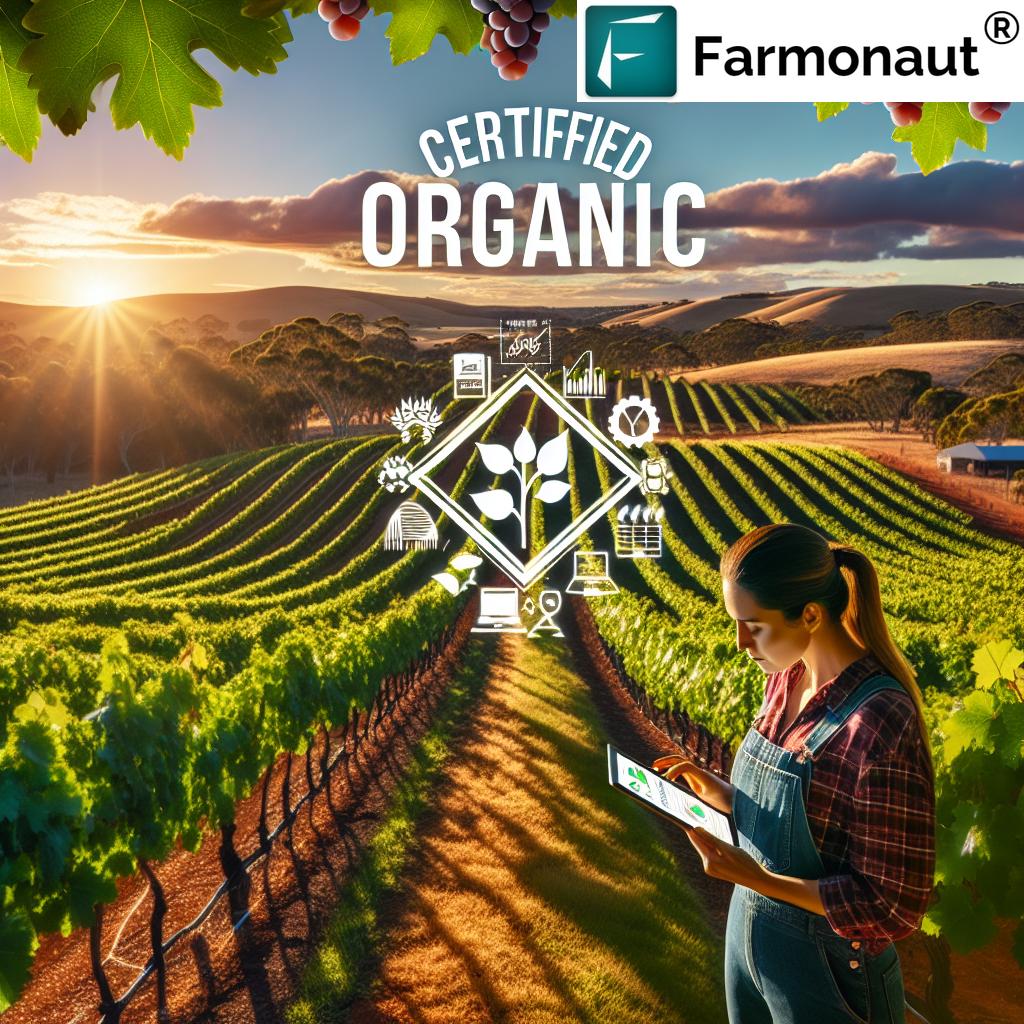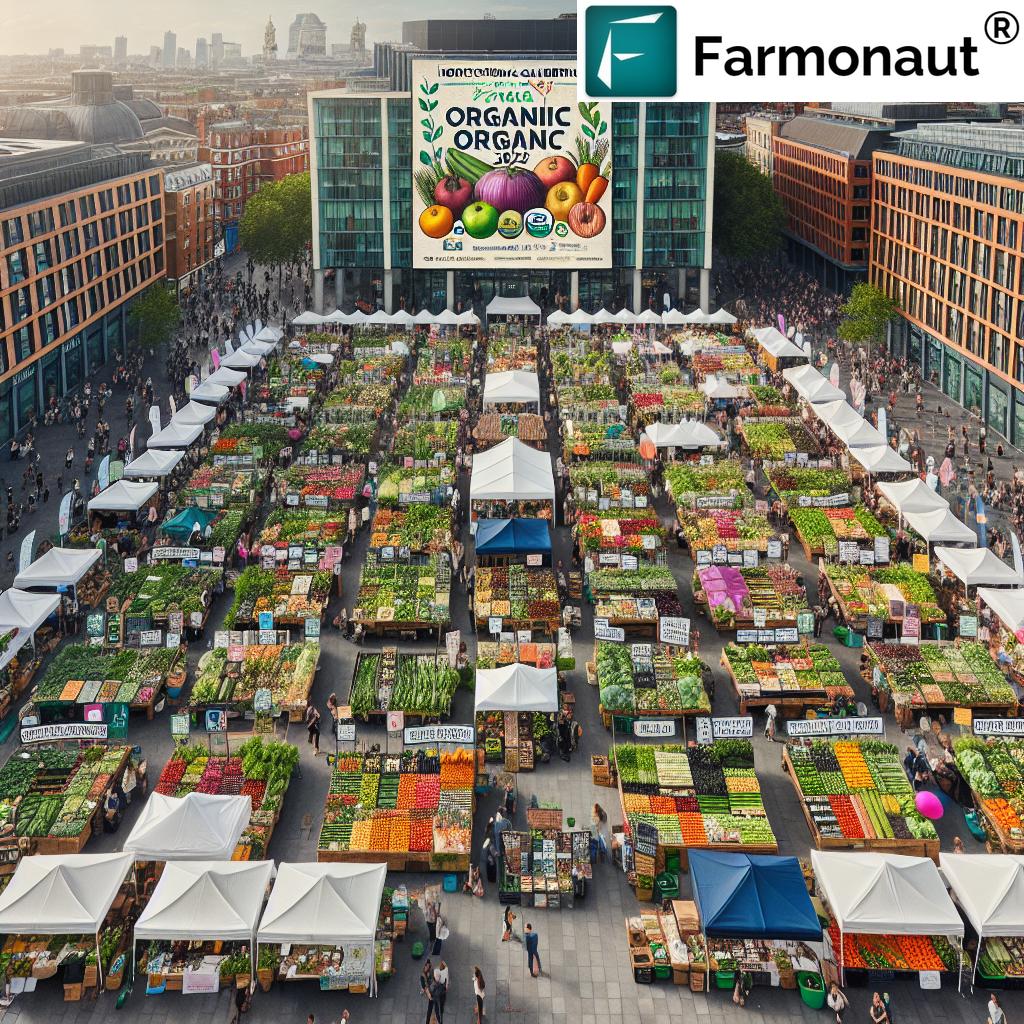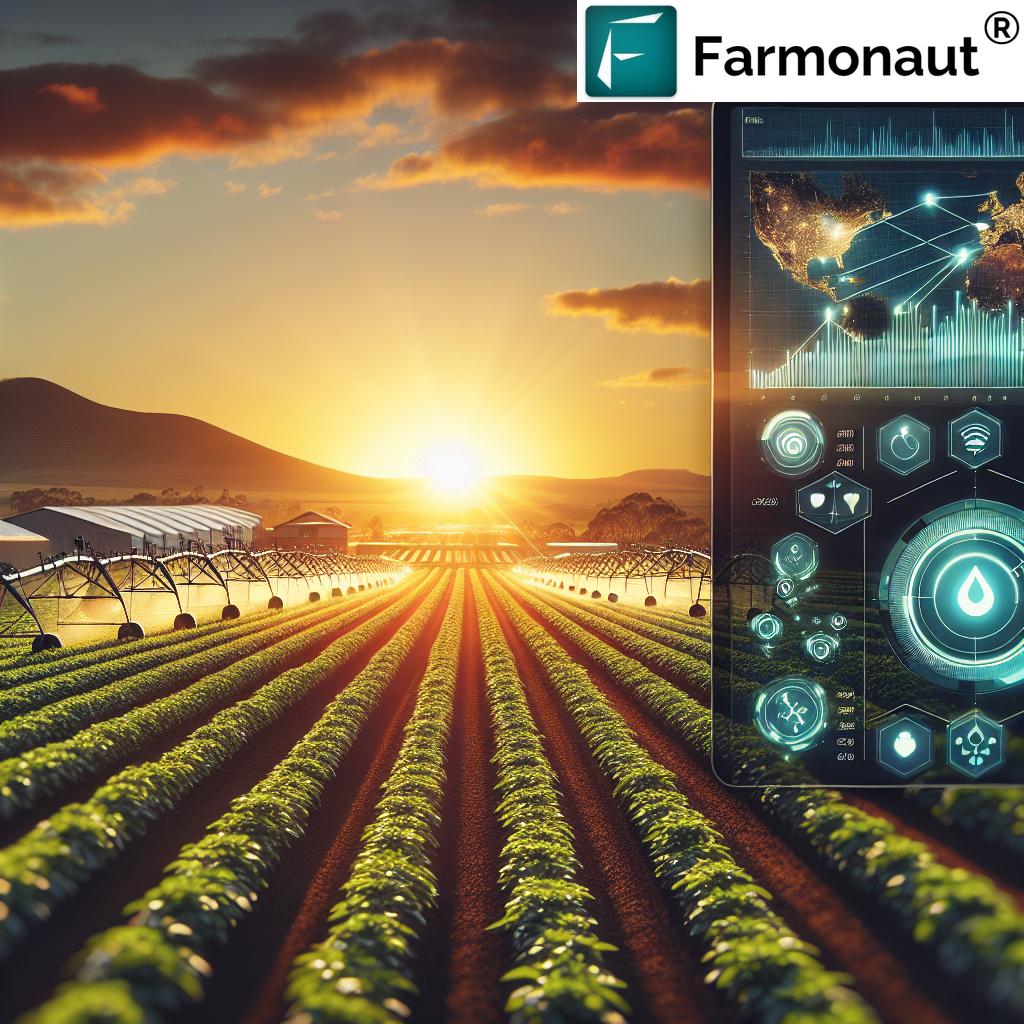Discover Australian Organic Industry Trends: 2024 Events and Sustainable Farming Innovations

“The Australian organic industry is projected to host over 5 major events in 2024, including the Australian Organic Conference.”
Welcome to our comprehensive exploration of the dynamic world of organic agriculture and sustainable farming methods in Australia for 2024. As we delve into the exciting developments shaping the Australian organic industry, we’ll uncover the latest trends, innovative events, and groundbreaking initiatives that are set to transform the landscape of sustainable agriculture.
At Farmonaut, we’re committed to supporting farmers and agricultural businesses with cutting-edge satellite-based farm management solutions. Our mission aligns perfectly with the growing focus on organic and sustainable farming practices in Australia. Let’s embark on this journey to discover how the industry is evolving and what opportunities lie ahead for farmers, businesses, and consumers alike.
The Rise of Organic Agriculture in Australia
The Australian organic industry has been experiencing remarkable growth in recent years, driven by increasing consumer demand for natural and healthy products. This surge in popularity has led to a flourishing ecosystem of organic farmers, producers, and retailers across the country.
- Consistent annual growth in organic food sales
- Expanding range of certified organic products
- Growing awareness of organic food benefits
- Increasing adoption of organic agriculture practices
As we look towards 2024, the industry is poised for even greater expansion, with several key events and initiatives set to shape its future.
2024 Australian Organic Industry Events: A Year of Innovation
The coming year promises to be an exciting one for the Australian organic sector, with a lineup of events that will showcase the latest in organic farming techniques, sustainable practices, and industry innovations. Let’s take a closer look at some of the most anticipated gatherings:
| Event/Initiative | Date (Est. 2024) | Key Focus Areas | Potential Impact |
|---|---|---|---|
| Australian Organic Conference | September 2024 | Organic certification processes, Market trends, Policy updates | High |
| Hort Connections | June 2024 | Horticulture innovation, Sustainable practices, Industry networking | High |
| Organic Awareness Month | September 2024 | Consumer education, Organic food benefits, Nationwide campaigns | Medium |
| Biodynamic Viticulture Symposium | April 2024 | Biodynamic wine production, Soil health, Holistic farming | Medium |
| GMO-Free Australia Forum | November 2024 | GMO-free production, Regulatory challenges, Consumer preferences | Medium |
Australian Organic Conference 2024
The Australian Organic Conference stands as the premier event for the organic industry in Australia. Set to take place in September 2024, this conference will bring together farmers, producers, retailers, and policymakers to discuss the latest trends and challenges in the organic sector.
- Keynote speeches from industry leaders
- Workshops on organic certification processes
- Panel discussions on market trends and consumer behavior
- Networking opportunities for organic businesses
This event is crucial for anyone looking to stay ahead in the organic industry, offering insights into regulatory changes, marketing strategies, and innovative farming techniques.
Hort Connections 2024
Scheduled for June 2024, Hort Connections is set to be a landmark event for the horticulture sector, with a strong focus on organic and sustainable practices. This conference and trade show will showcase the latest innovations in:
- Organic fruit and vegetable production
- Sustainable packaging solutions
- Water-efficient irrigation systems
- Organic pest management techniques
Hort Connections offers an unparalleled opportunity for organic farmers to connect with suppliers, learn about cutting-edge technologies, and explore new market opportunities.
Explore Farmonaut’s satellite-based farm management solutions: 
Sustainable Farming Innovations Shaping the Future
As we move into 2024, several innovative sustainable farming methods are gaining traction in the Australian organic industry. These techniques not only enhance productivity but also contribute to environmental conservation and soil health.
Regenerative Agriculture
Regenerative agriculture is emerging as a powerful approach to organic farming, focusing on:
- Improving soil health and biodiversity
- Enhancing water retention in soil
- Increasing carbon sequestration
- Promoting natural pest control
This holistic method is gaining popularity among Australian organic farmers for its ability to restore degraded landscapes while producing nutrient-dense crops.
Precision Organic Farming
The integration of technology in organic farming is revolutionizing the industry. Precision organic farming utilizes:
- Satellite imagery for crop monitoring
- AI-powered decision support systems
- IoT devices for real-time data collection
- Drone technology for targeted applications
At Farmonaut, we’re at the forefront of this revolution, offering advanced satellite-based solutions that help organic farmers optimize their operations while adhering to organic standards.
Discover Farmonaut’s API for developers: Farmonaut API
Organic Certification Process: Ensuring Trust and Quality
The organic certification process is a cornerstone of the industry, providing consumers with assurance about the integrity of organic products. In 2024, we anticipate several developments in this area:
- Streamlined certification procedures
- Enhanced traceability through blockchain technology
- Harmonization of international organic standards
- Increased support for farmers transitioning to organic
Understanding the certification process is crucial for farmers looking to enter the organic market. It involves rigorous standards for soil management, pest control, and overall farm operations.
Steps in the Organic Certification Process
- Application submission to a certifying body
- Detailed farm plan development
- On-site inspection by certified auditors
- Review of inspection reports
- Certification decision
- Annual renewal and compliance checks
Farmonaut’s satellite monitoring tools can assist farmers in maintaining compliance by providing accurate, real-time data on crop health and land use.
“Organic food sales in Australia have grown by approximately 20% annually, driven by increasing consumer demand for natural products.”
Australian Organic Industry Trends: Consumer Behavior and Market Dynamics
Understanding consumer trends is vital for success in the organic industry. In 2024, we’re seeing several key trends shaping the market:
- Growing preference for locally sourced organic products
- Increased demand for organic convenience foods
- Rising interest in organic personal care and household items
- Expansion of organic options in foodservice and hospitality
These trends are driving innovation in product development and marketing strategies across the organic sector.
Market Reports and Consumer Insights
Recent market reports highlight the robust growth of the Australian organic industry:
- Double-digit annual growth in organic sales
- Expanding shelf space for organic products in major retailers
- Increasing number of organic-focused specialty stores
- Growing export opportunities for Australian organic products
These trends underscore the importance of staying informed about market dynamics and consumer preferences in the organic sector.
Access Farmonaut’s developer documentation: API Developer Docs
Organic Food Benefits: A Focus on Health and Sustainability
The growing awareness of organic food benefits is a key driver of industry growth. Consumers are increasingly recognizing the advantages of choosing organic:
- Higher nutrient content in some organic foods
- Reduced exposure to synthetic pesticides and fertilizers
- Better taste and flavor profiles
- Positive environmental impact of organic farming practices
As health-conscious consumers seek out natural and healthy products, the organic industry is well-positioned to meet this demand.
Environmental Benefits of Organic Farming
Organic agriculture practices offer significant environmental benefits:
- Improved soil health and biodiversity
- Reduced water pollution from chemical runoff
- Lower carbon footprint compared to conventional farming
- Preservation of ecosystems and wildlife habitats
These environmental advantages are becoming increasingly important to consumers and policymakers alike, driving further support for the organic sector.
Climate Change and Agricultural Sustainability
Climate change poses significant challenges to agriculture, making sustainable farming practices more crucial than ever. The organic industry is at the forefront of addressing these challenges:
- Development of drought-resistant organic crop varieties
- Implementation of water-conserving irrigation techniques
- Adoption of carbon sequestration practices in organic farming
- Research into climate-resilient organic farming methods
Farmonaut’s satellite monitoring technology plays a vital role in helping farmers adapt to changing climate conditions by providing accurate, timely data on crop health and environmental factors.
Organic Farming’s Role in Climate Mitigation
Organic farming practices contribute significantly to climate change mitigation:
- Reduced reliance on fossil fuel-based inputs
- Increased carbon storage in organic soils
- Lower overall greenhouse gas emissions
- Promotion of biodiversity, which enhances ecosystem resilience
These benefits position organic agriculture as a key player in sustainable food production strategies.
Get Farmonaut on your mobile device:


Organic Awareness Campaigns: Educating Consumers and Farmers
Organic awareness campaigns play a crucial role in educating both consumers and farmers about the benefits and practices of organic agriculture. In 2024, we expect to see several initiatives:
- National Organic Week celebrations
- School-based organic education programs
- Social media campaigns highlighting organic success stories
- Farm tours and open days showcasing organic practices
These campaigns are essential for building consumer trust and encouraging more farmers to transition to organic methods.
Digital Marketing Strategies for Organic Businesses
In the digital age, organic businesses are leveraging various online platforms to reach consumers:
- Influencer partnerships promoting organic lifestyles
- Interactive websites showcasing farm-to-table journeys
- Virtual reality farm tours
- E-commerce platforms specializing in organic products
These digital strategies are helping organic brands connect with consumers and build loyal customer bases.
Organic Farming Regulations: Navigating the Regulatory Landscape
The regulatory environment for organic farming in Australia is constantly evolving. Key areas of focus for 2024 include:
- Updates to the National Standard for Organic and Bio-Dynamic Produce
- Harmonization of domestic and international organic standards
- Enhanced traceability requirements for organic supply chains
- Review of allowable inputs and practices in organic production
Staying informed about these regulatory changes is crucial for organic farmers and businesses to maintain compliance and access markets.
Export Opportunities for Australian Organic Products
The global demand for organic products presents significant export opportunities for Australian producers:
- Growing markets in Asia for Australian organic beef and dairy
- Increased interest in Australian organic wines in Europe and North America
- Emerging opportunities for organic cosmetics and personal care products
- Rising demand for Australian organic grains and pulses
Navigating international organic standards and certification requirements is key to success in export markets.
Innovative Practices in Organic Horticulture
The horticulture sector is a significant component of Australia’s organic industry. In 2024, we’re seeing several innovative practices gaining traction:
- Vertical organic farming in urban areas
- Aquaponics systems integrating organic fish and vegetable production
- Use of beneficial insects for pest control in organic greenhouses
- Development of organic hydroponic systems
These innovations are expanding the possibilities for organic production, especially in challenging environments.
Biodynamic Viticulture: A Growing Niche
Biodynamic viticulture is gaining popularity among Australian winemakers:
- Holistic approach to vineyard management
- Use of natural preparations to enhance soil and plant health
- Alignment of vineyard activities with lunar and celestial cycles
- Focus on creating self-sustaining vineyard ecosystems
This approach is producing unique, high-quality wines that are attracting attention in both domestic and international markets.
GMO-Free Production: Meeting Consumer Demands
The demand for GMO-free products continues to grow, with organic certification ensuring products are free from genetic modification. Key aspects include:
- Strict regulations prohibiting GMOs in organic production
- Increased consumer awareness and preference for non-GMO foods
- Development of GMO-free supply chains
- Research into traditional breeding techniques for crop improvement
Farmonaut’s satellite monitoring can help farmers maintain GMO-free status by providing accurate field data and supporting traceability efforts.
Soil Health: The Foundation of Organic Farming
Soil health is paramount in organic farming, with a focus on:
- Building organic matter through composting and cover cropping
- Minimizing soil disturbance to preserve soil structure
- Encouraging beneficial soil microorganisms
- Implementing crop rotations to maintain soil fertility
Healthy soils are the cornerstone of sustainable organic production, supporting robust crops and resilient farming systems.
The Future of Australian Organic Industry: Opportunities and Challenges
As we look towards the future of the Australian organic industry, several key trends and challenges emerge:
- Continued market growth and diversification
- Increasing integration of technology in organic farming
- Challenges in scaling up organic production to meet demand
- Opportunities for innovation in organic processing and packaging
The industry’s ability to address these challenges while capitalizing on opportunities will shape its trajectory in the coming years.
Farmonaut’s Role in Supporting Organic Agriculture
At Farmonaut, we’re committed to supporting the growth and sustainability of organic agriculture through our advanced satellite-based farm management solutions. Our technology offers organic farmers:
- Real-time crop health monitoring
- AI-powered advisory systems for organic farm management
- Tools for efficient resource management
- Support for maintaining organic certification compliance
By leveraging these technologies, organic farmers can optimize their operations, improve yields, and contribute to a more sustainable food system.
Conclusion: Embracing a Sustainable Future
The Australian organic industry is poised for significant growth and innovation in 2024 and beyond. From cutting-edge events to sustainable farming practices, the sector is evolving to meet the challenges of climate change and growing consumer demand for natural and healthy products.
As we’ve explored in this comprehensive guide, the opportunities for farmers, businesses, and consumers in the organic space are vast. By staying informed about industry trends, leveraging innovative technologies, and participating in key events, stakeholders can position themselves for success in this dynamic and rewarding field.
At Farmonaut, we’re excited to be part of this journey, providing the tools and insights needed to support sustainable, organic agriculture. Together, we can build a more resilient, healthy, and environmentally friendly food system for Australia and the world.
FAQ Section
Q: What are the main benefits of organic farming?
A: Organic farming offers numerous benefits, including improved soil health, reduced exposure to synthetic pesticides, enhanced biodiversity, and often higher nutrient content in produce. It also contributes to environmental sustainability by reducing chemical runoff and promoting ecosystem balance.
Q: How can I transition my conventional farm to organic?
A: Transitioning to organic involves several steps: 1) Develop a conversion plan, 2) Stop using prohibited substances, 3) Implement organic soil management practices, 4) Begin the certification process, which typically takes 3 years, 5) Maintain detailed records of farm practices. Farmonaut’s satellite monitoring can assist in this transition by providing accurate data on crop health and land use.
Q: What role does technology play in organic farming?
A: Technology plays an increasingly important role in organic farming. Satellite imagery, AI-powered advisory systems, and precision agriculture tools help organic farmers optimize resource use, monitor crop health, and maintain compliance with organic standards. Farmonaut’s solutions, for example, provide real-time insights that support sustainable farming practices.
Q: How does organic certification work in Australia?
A: Organic certification in Australia involves applying to a certified organic body, developing a detailed farm plan, undergoing on-site inspections, and adhering to national organic standards. The process typically takes 1-3 years, depending on previous land use. Annual audits are required to maintain certification.
Q: What are the main challenges facing the organic industry in Australia?
A: Key challenges include scaling up production to meet growing demand, maintaining soil fertility without synthetic inputs, managing pests and diseases organically, and navigating complex certification processes. Climate change also poses significant challenges, requiring adaptive strategies in organic farming practices.


















